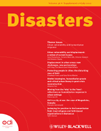
Urban displacement is frequently portrayed as a new and unfamiliar dilemma for the humanitarian sector, yet broad awareness of its characteristics and challenges has been developing since the 1970s. In the past decade, however, there has been greater attention to, and recognition of, the implications of rapid urbanisation in the developing world. This has led to some policy development and a mounting body of NGO (non-governmental organisation) and think-tank literature on the topic. Assuming displacement to be a key lens on urban vulnerability more broadly, this paper presents an overview of the historical development of debates on urban displacement since the 1970s. Drawing examples from the contributions in this special issue of Disasters, as well as from other sources of information on recent humanitarian responses in various contexts, it assesses the ramifications of urban vulnerability for humanitarian practitioners. The paper contends that the humanitarian sector has failed to galvanise on the issue, and has struggled therefore to employ existing knowledge and to adapt practice.
Links
Resource collections
- UN Habitat - Urban Response Collection
- Urban Response - Urban Crisis Preparedness and Risk Reduction
- Urban Response Collection - Community Engagement and Social Cohesion
- Urban Response Collection - Economic Recovery
- Urban Response Collection - Environment and Climate Change
- Urban Response Collection - Housing, Land and Property
- Urban Response Collection - Urban Crisis Response, Recovery and Reconstruction
- Urban Response Collection - Urban Resilience